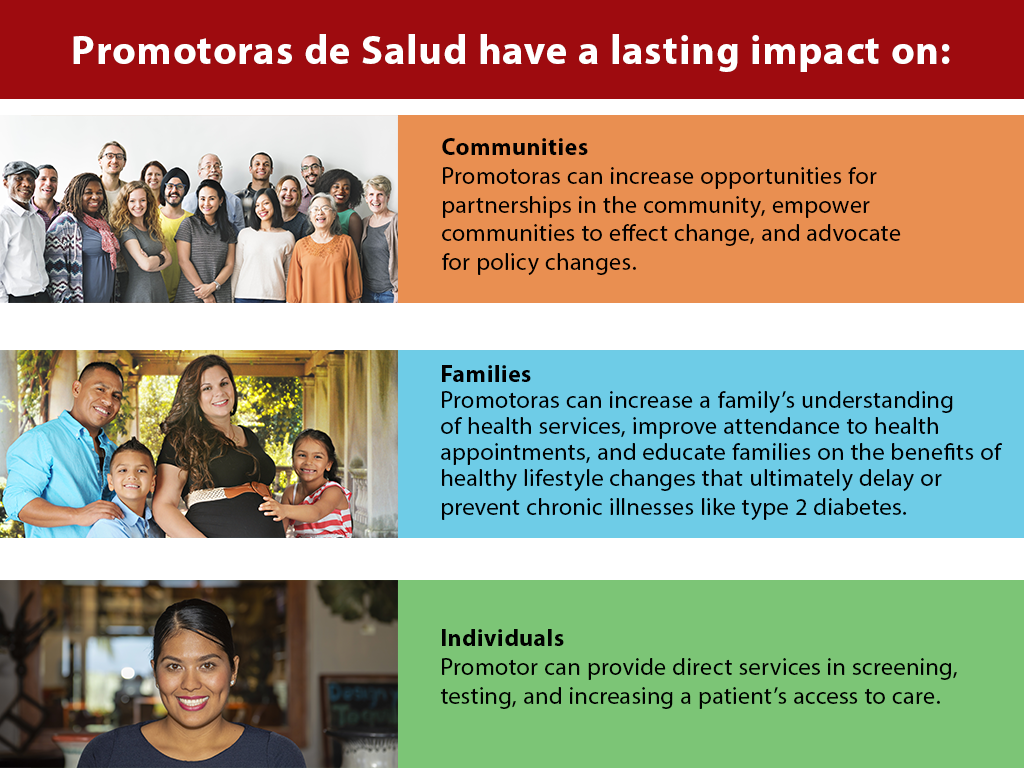|
Register Today!
September 25th-27th · Denver, CO Early Bird Registration Rates End Friday, September 6th! Hotel - Special rates until September 2nd Join us in Denver for a great learning and networking experience! Don't miss the 3 energizing days of dynamic plenaries around leadership and self-care, priority topics such as diabetes, HIV, and Ag Worker access! Continuing education credits available for CME, CNE, NASW, and TX CHW. Check out the Preliminary Program! For additional conference or hotel information, click here. If any questions, contact Sylvia Gomez at (512) 312-5459 or [email protected]. Promotores(as) de saludare frontline community health workers who have a deep understanding of the communities they serve. They often live in the community themselves and are trusted liaisons in healthcare settings.
Promotores are experts on outreach and can provide crucial information to hard-to-reach communities, especially amongst the Latino population. They bridge the cultural gap with patients by providing services that are linguistically appropriate. Promotores address other social determinants of health aside from communication and language barriers such as improving health literacy, decreasing transportation challenges, referring patients to community resources, and advocating for policy change. They are key to breaking down barriers that keep many Latinos and other underserved populations from obtaining quality, accessible healthcare. Research shows that promotores de salud are particularly effective in addressing chronic illnesses like hypertension, heart disease, cancer, and diabetes. The Latino population is at greater at risk of prediabetes and often develop more serious conditionsincluding type 2 diabetes, kidney failure, diabetic eye disease, and stroke.Prediabetes is a blood glucose (sugar) level that is higher than normal but not high enough to be diagnosed as diabetes. Statistics show that about 32% of Latinos have prediabetes and 50% of Latinos eventually develop type 2 diabetes, a 10% higher rate for diabetes than the national average in the United States. Promotores de salud help prevent or delay diabetes by working with patients and their families. They use educational tools, like “Shopping at La Tiendita,” to inform patients about how to access and prepare healthy foods, change their eating habits, and increase their physical activity to lead a healthier lifestyle. Promotores also promote screenings for prediabetes and diabetes, connect and enroll patients in CDC-recognized Diabetes Prevention Programs, and educate health providers on factors that impact a patient’s continuity of care. Promotores de saludare in the best position to provide health education and support to patients in their own communities. For additional information and resources available to healthcare workers and patients on diabetes prevention and self-management, check out our Diabetes Resource Hub. You can also find more information about training programs for Promotores de saludwith one of our FHN partners, MHP Salud. Sources: Centers for Disease Control and Prevention. National Diabetes Statistics Report, 2017. Atlanta, GA: Centers for Disease Control and Prevention, US Department of Health and Human Services; 2017. National Center for Health Statistics, National Health Interview Survey, 2016. https://gis.cdc.gov/grasp/diabetes/DiabetesAtlas.html https://www.cdc.gov/diabetes/atlas/countydata/atlas.html CDC, 2017. Health, United States, 2016. Table 58. http://www.cdc.gov/nchs/data/ hus/hus16.pdf US Census Bureau, 2010 Harris, MI, et al., “Is the risk of diabetic retinopathy greater in non-Hispanic blacks and Mexican Americans than in non-Hispanic whites with type 2 diabetes? A U.S. population study.” Diabetes Care. 1998 Aug;21(8):1230-5. Brownstein J, Bone L, Dennison C, Hill M, Kim M, Levine D. Community health workers as interventionists in the prevention and control of heart disease and stroke. Am J Prev Med. 2005: 29 (5): 128-133. Brownstein J, Chowdhury F, Norris S, et al. Effectiveness of community health workers in the care of people with hypertension. Am J Prev Med. 2007; 32 (5): 435-447. Allen J, Dennison C, Himmelfarb D, Szanton S, Frick K. Cost-effectiveness of nurse practitioner/community health worker care to reduce cardiovascular health disparities. J Cardiovasc Nurs. 2013; 29 (4): 1-7. Gary TL, Bone LR, Hill MN, et al. Randomized controlled trial of the effects of nurse case manager and community health worker interventions on risk factors for diabetes-related complications in urban African American. Prev Med. 2003; 37 (1): 23-32. [GC1]Hyperlink CLAS somehow, but only found an archived webinar |
The National Center for Farmworker HealthImproving health care access for one of America's most vulnerable populations Archives
July 2024
Categories
All
|



 RSS Feed
RSS Feed